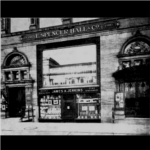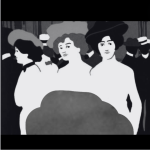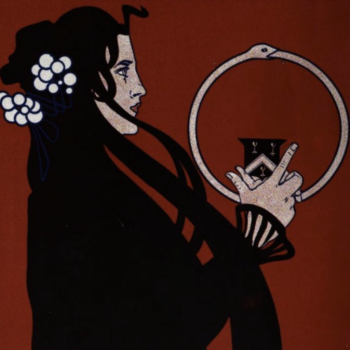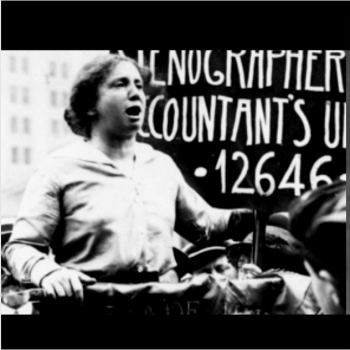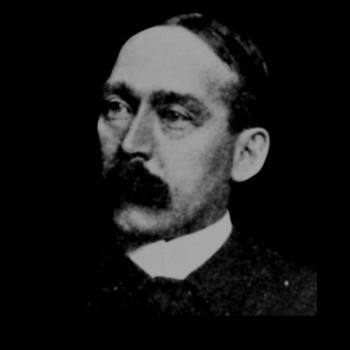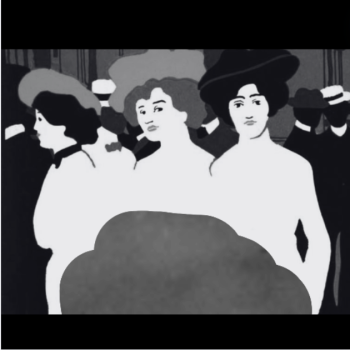“On my penetrating into the Ascension at chosen noon, and standing for the first time in presence of that noble work of John La Farge, the representation on the west wall in the grand manner of the theological event from which the church takes its title. Wonderful enough in New York to find one’s self in a charming, and considerably dim old church, hushed to admiration before a great religious picture.”
Henry James. “New York Revisited.”
THE CALL
Irvine had become intimately acquainted with Percy S. Grant, and after holding out for six months, finally accepted the call in August 1907. When he arrived at the church a note was handed to him to preach at the Chapel of the Comforter, 10 Horatio Street, the chapel of the parish.[1] Irvine was amazed. They had never talked of the chapel. Irvine imagined all sorts of things. It was in a bad part of town, near the headquarters of the Hudson Dusters, “an old brick building with a high stoop, of the style of ante-bellum days,” on Hudson Street, just below Horatio Street.[2]
He went to the chapel. There were about a dozen people there. “Dorcas Room pensioners” was the thought in his mind as he looked them over.
“Good friends,” said Irvine when the time for the sermon arrived, “it’s a very hot night, and out there in the park there are about ten thousand people. I am going out to give the sermon. Stay here, and I will return and pronounce the benediction.”
The following morning, he took breakfast with Grant.
“How many people did you have?” asked Grant.
“There were about seven thousand within the sound of my voice!”
“But,” said Grant incredulously, “it doesn’t even hold a hundred.”
“Oh, you mean the chapel!” said Irvine. “There were about a dozen poor old things there. I went out into the Square, got a bench, clapped my hands, sang a verse of a hymn, and when they surged around me like a sea, I addressed them.”
Soon the crowds were too big for the chapel, so Grant, who was conducting services in Harvard’s Appleton Chapel for the week of October 20, 1907, asked Irvine to preach at the Ascension.[3] It was then when Irvine began his series of pulpit addresses.[4]
There was no contract, no pledge asked or given. Irvine was to have perfect freedom. The evening service was his work. He could make of it what he liked. So, he did. It was not a prayer book service. It was not literally morning prayer nor evening prayer. It was a sort of go-as-you-please service. [5] Though Irvine did not flaunt his political program (initially, at least,) the thought of an openly avowed Socialist called as a colleague to the rector was a puzzle that gravely concerned the conservative people (and gave news material for the newspapers.) He series of Sunday evening addresses continued through the winter, and working men began attending in numbers. His topics of choice dealt with the themes in Victor Hugo’s Les Misérables. The Good Bishop, Fantine, Jean Valjean, and The Message of Victor Hugo to the Twentieth Century. Irvine tried to interpret the news of the day, and the life of his time, from what I conceived to be the Christian point of view. There was opposition from the start. All the “cheeseparing experts” protested. The Fundamentalists were alarmed. One morning Grant left the breakfast table to answer the telephone.
“Here is a good brother—a clergyman—who wants to know if you were ever confirmed,” said Grant, covering the receiver with his hand.
“Tell him that I was confirmed by the Lord Bishop of Down, Connor and Dromore,” Irvine replied.
“That oughtta fix him!” Grant replied as he repeated it into the phone.
The New York Sun kept up a continual barrage. It opened every Monday. The church was crowded at every service.
BISHOP POTTER’S TWO COCKTAILS.
On December 2, 1907, Grant and Bishop Potter attended the farewell dinner for Chozo Koike, the Japanese Consul General, was hosted by the Japan Society at the Hotel Astor. Koike was leaving the following day to assume the duties of consul general of Japan at San Francisco, which office has been raised from a consulship because of its growing importance. His new responsibilities would be to report to his government on the Japanese situation on the Pacific Coast.
The one hundred fifty guests were evenly split between American and Japanese men and women, with the speakers being Lindsay Russell, the toastmaster; Professor Alexander Tison; Dr. Yeijero Ono, and Bishop Potter.
In Russell’s introduction of Koike, he told of his new post and told of his rise from an office in the State Department at Tokyo, his promotion to a secretaryship at Japan’s Legation at Beijing, then at London, and a year ago, the consul generalship in New York.
“I wish to express my sincere thanks for this magnificent tribute,” Koike said. “It was only eleven months ago that I came to New York, which I now have to leave with regrets. Not only is my wife and myself sorry at this sudden and unexpected departure, but Tokyo also is sorry over the circumstances that compel it. Everybody has received us with extreme kindness, and it is a consolation to know that we leave here with feelings of kindness instead of enemies. I know that my task at San Francisco will not be easy, but when I remember the close friendships I have made here I feel encouraged. I need hardly say that this tribute will be appreciated by my country, which will always be anxious for friendly relations with the United States.” A letter from Andrew Carnegie read next mirroring the sentiments of Koike.[6]
Bishop Potter provided some levity with his turn to speak. “There is just one fault I have to find with the temples of your country, my dear consul-general,” said the bishop, “and that is that in many cases the steps approaching the sacred fans are so long and wearisome that they leave the traveler quite exhausted at the portal. One day the Rev. Percy Grant, who sits at my right here, and who was my companion on my trip to Japan, and I climbed ever so many steps to see a temple at Yokohama. When we returned to host hotel I was quite worn out.
“I called a Japanese servant and ordered a Manhattan cocktail. Now, you know, I had no idea that he knew what I meant by a Manhattan cocktail, but was quite sure that he would bring me something and say that it was a Manhattan. Such is the ingenuity of your race, my dear consul-general.
“To my surprise he brought not only one genuine Manhattan cocktail, but two—”
A ripple of applause went around the banquet table and several diners leaned forward in expectancy.
“Well, here was a predicament,” continued Bishop Potter in the smoothest of tones. “I am sorry to say—or should I say that I am very glad to say?—that the Rev. Percy Grant here is a teetotaler, and that one of his relatives on the distaff side is a very well-known member of the Woman’s Christian Temperance Union—a very well-known member.”
“‘Grant,’ said I, ‘you will have to drink this other cocktail.’
“‘But, my dear bishop,’ he protested, ‘what is the effect of this cocktail?
“‘It is exhilarating, my dear Grant,’ said I.
“Grant drank that cocktail and in a very few minutes he began to himself about the region of the vest—he is rather an expansive man in some particulars, you know—at least he was then.
“‘Bishop,’ he said to me, ‘you are right—that is exhilarating!’
“Then I called the bartender and asked him how it happened that in Yokohama he knew how to make a Manhattan cocktail. ‘Oh, I used to run a hotel in Cincinnati,’ he replied.”
Bishop Potter was in good spirits, and expressed his enthusiastic over Irvine’s success, and gave both men his personal encouragement.
CHURCH FORUM.
Irvine soon conducted a forum for a men’s club in the Chapel of the Comforter on Wednesday evenings, and a series of early morning meetings for the milkmen of the city, and midnight meetings at the ferries.
“Our position in the matter is perfectly plain,” said Grant. “Here we have the plant, comfortable seats, music, and a pleasant interior. Whoever cares to come in is welcome, the seats are free. We open the pulpit to Mr. Irvine who is certainly free to say whatever it is his desire to say. There are no strings anywhere. We are not trying to make church service. In fact, the matter of church membership simply has not been thought of.”[7]
One night Irvine asked anyone who cared to do so to linger for half an hour to meet Grant and himself in the chapel just off the robing room. They had prepared coffee and cake. The crowd filled to uncomfortableness all the space. The following Sunday night they repeated the social hour.
“Who is that tall, broad-shouldered man?” one of the rich ladies of the church asked Irvine. “He looks like an orator.”
“He is,” laughed Irvine. “His name is Sol Fieldman.”
“Won’t you ask him to speak?”
“No, thank you!” said Irvine. “I don’t want to explode dynamite.”
She smiled and repeated the request to Grant.
“Why not?” asked Grant.
“Go ahead,” Irvine replied. “Turn him on, but if you don’t turn him off in five minutes there will be a riot.”
Irvine called for order and introduced the man. His voice sounded like the softened reverberations of far-off thunder. He was brief, too.
“I have never been in a Christian church before,” he began. “I am the son of a rabbi, and a revolutionist; but I take my hat off to this church. Here you are interpreting life as I think Jesus, who was also a Jew and a revolutionist, would do it.”
From that time onward, the character of the after-meeting changed. The first few evenings after Fieldman spoke were very informal. Anyone of note who happened to be in the meeting was encouraged to speak. The Socialists were always in the majority. That was the beginning of the Church Forum movement of the United States. There were forums before that, but not in the churches.[8]
PEOPLE OF THE UNDERWORLD
I. INTERCOLLEGIATE SOCIALIST SOCIETY.
II. THE CRY OF PEONAGE.
III. MUCKERS.
IV. GALLAGHER’S HELL.
V. PUNK.
VI. SOUDAN.
VII. BOWERY.
VIII. “IT IS A BETTER FLAG THAN THE AMERICAN FLAG.”
IX. PENETRATING THE ASCENSION.
X. “THE UNIVERSE IS BASED ON THE SUBJECTION OF WOMAN.”
XI. PROGRESSIVE WOMAN SUFFRAGE UNION.
XII. THE CHRISTIAN SOCIALIST FELLOWSHIP.
XIII. THE ERUPTION OF THE END.
SOURCES:
[1] “Grant Reviews His 30 Years as Rector.” The New York Times. (New York, New York) February 2, 1923.
[2] “Hudson Dusters—Night Terrors of Greenwich Village.” The Sun. (New York, New York) January 18, 1914.
[3] “Our Folks and Other Folks.” The Fall River Daily News. (Fall River, Massachusetts) October 21, 1907; “Grant Reviews His 30 Years as Rector.” The New York Times. (New York, New York) February 2, 1923.
[4] “General Items of the Week.” The New York Tribune. (New York, New York) October 19, 1907.
[5] “Grant Reviews His 30 Years as Rector.” The New York Times. (New York, New York) February 2, 1923.
[6] “I deeply regret that an engagement which could not be cancelled prevents my acceptance of your valued invitation, because I should have greatly liked to say a few words to the members of the Japan Society, and also to congratulate Hon. Chozo Koike on his promotion. I consider the reserved and wise action of the two governments of Japan and the United States in the recent excitement one of the most cheering signs of our age. It was just as that of two intimate friends should be, between whom, unfortunately, a slight difference had arisen. Each loved the other so well that not one word calculated to offend was uttered. On the contrary, those highest in authority were foremost in setting the example as peacemakers and beseeching others t« do likewise. War between the two branches of our English speaking race is no longer possible, as has been proved in the Venezuela case, when the British government put itself in the wrong side by refusing to arbitrate that question at the request of America. When America urged arbitration the British people arose and compelled their government to reverse its decision and comply with the American request. So it would be again if any dispute should arise. We see that the difference between Newfoundland and the United States upon the fishing question has been submitted to The Hague. There are special reasons why the people or Japan and America should never kill each other like wild beasts on the field of battle. America was the first Western nation which entered into friendly relations with Japan. The people of Japan may rest assured that as she was the first to enter into peaceful treaties, so she will be the last to disturb the peaceful and highly satisfactory arrangements which now so happily exist between the two lands.” [“Japan Society Dinner” The New York Tribune (New York, New York) December 3, 1907; “Bishop Potter’s Two Cocktails” The Fall River Daily Evening News (Fall River, Massachusetts) December 3, 1907.]
[7] “Social Secretary for Church of the Ascension.” Charities and the Commons. Vol. XIX, No. 8. (November 23, 1907): 1088.
[8] Irvine, Alexander. From the Bottom Up: The Life Story of Alexander Irvine. Gosset & Dunlop. New York, New York (1910): 274-275; Irvine, Alexander. A Fighting Parson: The Autobiography of Alexander Irvine. Little, Brown, and Company. Boston, Massachusetts. (1930): 81-82.


